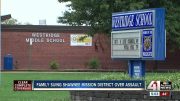On Monday Northern California Judge Barry Goode denied the claims in the Doe v. Antioch Unified lawsuit – the second legal setback in recent months to education advocates who believe ineffective teacher have too many job protections.
Lawyers who filed the suit on behalf of the parents of school children and California taxpayers claimed that the 13 districts, including seven in Southern California, blatantly violated the Stull Act by prohibiting the use of standardized test scores to evaluate teachers.
The school districts countered that argument by submitting testimony from school district officials that described how student test scores were used at the central office to the school sites, including in how to evaluate teachers.
In his 40 page ruling, Judge Goode said that the testimony was sufficient to demonstrate that districts do use test scores and that districts have flexibility over how the scores should be used.
“I think [the decision is] a victory for California school districts and local control,” said lawyer Mark Bresee, who represented five of the school districts. “It is consistent with the spirit of the education code and the teacher evaluation provisions because all of these districts have been and will continue to incorporate student test score data into their teacher evaluation processes.”
Joshua Lipshutz, one of the lawyers who filed the lawsuit for the education advocacy group Students Matter, said the ruling did not take into account if schools linked rising or dropping test scores to teacher evaluations.
“Unfortunately I think the court today got it completely wrong,” Lipshutz said.
Students Matter said it’s considering an appeal.
This is the second legal setback for the group in the last month. On August 22, California’s Supreme Court allowed a lower court ruling to stand against the group’s Vergara lawsuit.
That suit attempted to overturn job protections for California teachers, claiming they shielded grossly ineffective teachers.
While seeing Monday’s ruling as another setback for Students Matter, some education researchers underlined that the ruling shouldn’t be interpreted to mean that schools’ teacher evaluation methods are effective.
“I think that there are a number of folks who think that teacher evaluation could be strengthened in California,” said University of Southern California education researcher Morgan Polikoff. “And this ruling is one more piece of evidence that it’s probably not going to happen through the courts. If it’s going to happen, it needs to happen through the legislature.”
By and large, he said, teacher evaluations don’t happen frequently enough and the evaluations don’t adequately offer struggling teachers the help they need to succeed or to find another job.
Source: www.scpr.org




